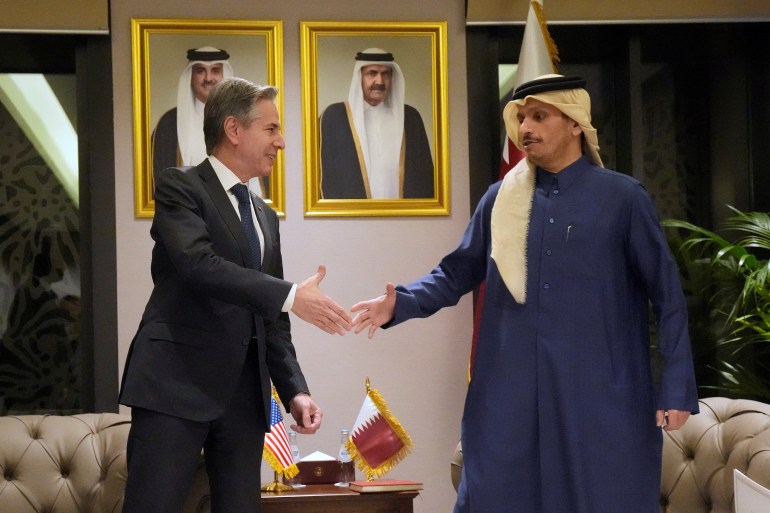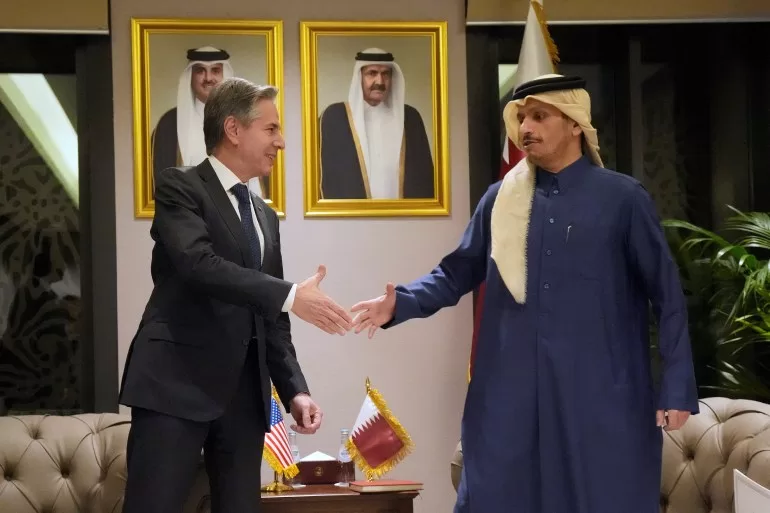During a press conference on Tuesday with US Secretary of State Antony Blinken, Qatar’s Prime Minister Sheikh Mohammed bin Abdulrahman bin Jassim Al Thani described Hamas’s reaction to the proposal as “generally positive”, without providing more details.
Blinken said Hamas’s response to the proposal brokered by Qatar, Egypt and the United States has been shared with Israeli officials.
Blinken is on a lightning tour of the Middle East, and said that he would discuss the response with Israel’s officials when he visits the country on Wednesday.
Speaking to reporters in Doha on Tuesday, Blinken said the deal is “essential”.
“There’s still a lot of work to be done. But we continue to believe that an agreement is possible and indeed essential, and we will continue to work relentlessly to achieve it,” he said.
Hamas said in a statement that its leaders had reviewed the “comprehensive ceasefire deal … with a positive spirit”, including details on securing relief and shelter, reconstruction, the lifting of a 17-year-old crippling siege, and the completion of the “prisoner exchange” process.

Qatar has been working with the US and Egypt to broker a truce that would involve an extended halt in fighting and the release of hostages held by Hamas.
PM Sheikh Mohammed Al Thani said there are a number of challenges that mediators are facing throughout the talks, and that events on the ground in Gaza affect the course of the negotiations.
“We are hoping to see it yielding and yielding very soon,” he said.
Earlier, Blinken met Qatar’s Emir, Sheikh Tamim bin Hamad Al Thani.
I met with Amir Sheikh @TamimBinHamad in Doha to discuss efforts to secure the release of all remaining hostages held by Hamas. We appreciate Qatar’s partnership and indispensable role in mediating. pic.twitter.com/NYUp4NvPk7
— Secretary Antony Blinken (@SecBlinken) February 6, 2024
The proposed deal was drawn up more than a week ago by US and Israeli spy chiefs at a meeting with Egyptian and Qatari officials.
Hamas has said previously that any deal must bring about a definitive end to the war. Israel has said it will not halt the war permanently until Hamas is destroyed.
A 40-day truce?
Sources close to the talks have said the truce would last at least 40 days, during which fighters would free civilians among the remaining hostages they hold. Further phases would follow, to hand over soldiers and the corpses of hostages, in exchange for the release of Palestinians imprisoned in Israel.
The only truce so far, in November, was initially agreed for just four days and extended to last a week. At the time, Hamas released 110 hostages in exchange for 240 Palestinian prisoners in Israeli jails.
Most of the besieged enclave’s 2.3 million population is displaced, facing severe shortages of food, water, medicine, and shelter, with the majority of Gaza now in ruins following nearly four months of Israeli bombardment.
Israel began its military offensive in Gaza after Hamas fighters killed 1,139 people and took around 150 hostages in southern Israel on October 7, according to an Al Jazeera tally based on official Israeli figures.
At least 27,585 people have been confirmed killed in Israel’s military campaign, with thousands more feared buried under rubble, according to Palestinian health authorities in Gaza.
More than 66,000 others have been wounded, according to Palestinian authorities.
In his remarks, Blinken outlined the US’s vision for the region, emphasising Israeli integration. He mentioned continuing US efforts to promote normalisation deals that critics say sideline Palestinians and do little to address the political problems at the root of the conflict.
His visit comes amid statements from Israel that it plans to expand its ground attacks in Gaza, particularly in the southern governorate of Rafah that is crammed with internally displaced Palestinians.
Rafah, on the Egyptian border, is where more than half of Gaza’s population have sought refuge and are now living in increasingly miserable conditions.
United Nations humanitarian monitors said Tuesday that Israeli evacuation orders now cover two-thirds of Gaza’s territory, driving thousands more people every day towards the border areas.
Egypt has warned that an Israeli deployment along the border would threaten the peace treaty the two countries signed more than four decades ago. Egypt fears an expansion of combat to the Rafah area could push terrified Palestinian civilians across the border, a scenario Egypt has said it is determined to prevent.
Blinken, who met with Egyptian President Abdel Fattah el-Sisi in Cairo earlier on Tuesday, has said repeatedly that Palestinians must not be forced out of Gaza.
Many have criticised the US and the secretary of state himself for not taking a tougher tone with Israeli officials, even as they have publicly contradicted US positions on the future of Palestine and on military action and humanitarian aid in Gaza.
